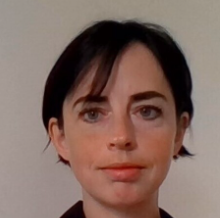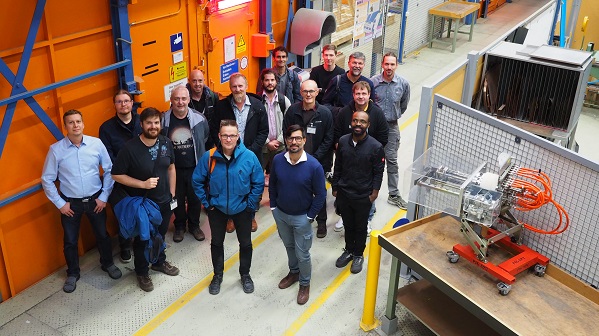Sie sehen momentan nur den öffentlichen Teil des GSI-Kuriers.
Um auch die GSI-internen Artikel angezeigt zu bekommen,
melden sie sich bitte an

Kurier - Mitteilungen von und für Mitarbeitende
Ausgabe: 44-2022 | 31.10. - 06.11.
Nachrichten
- PANDA Kollaboration zeichnet Doktorandin aus: PhD-Preis für Dr. Jenny Regina
- ERIBS Meeting auf GSI Campus
- Interne Stellenauschreibungen
Wissenschaftliche Sitzungen/Seminare bei GSI
Nachrichten
PANDA Kollaboration zeichnet Doktorandin aus: PhD-Preis für Dr. Jenny Regina

Quelle: JR/private
Dr. Jenny Regina ist für ihre Promotionsarbeit an der Universität Uppsala "Time for Hyperons. Development of Software Tools for Reconstructing Hyperons at PANDA and HADES" mit dem PANDA PhD Preis 2022 ausgezeichnet worden. Betreuer der Promotion war Prof. Dr. Karin Schönning. Bekannt gegeben wurde die Auszeichnung beim jüngsten PANDA-Kollaborationstreffen durch den Sprecher der PANDA-Kollaboration, Ulrich Wiedner von der Ruhr-Universität Bochum.
Der PhD-Preis wird seit 2013 einmal jährlich von der PANDA-Kollaboration für die beste Dissertation verliehen, die im Rahmen des PANDA-Experiments erstellt wurde.
In ihrer Dissertation hat die Physikerin Dr. Jenny Regina eine detaillierte Hyperonen-Simulationsstudie des PANDA Detektors, Entwicklungen von zeitbasierten Algorithmen zur Spurrekonstruktion für PANDA und eine Programmbibliothek zu kinematischen Anpassungen im HADES Experiment vorgestellt. Ein Kandidat für online Spurrekonstruktions-Algorithmen wurde entwickelt und getestet basierend auf einem 4-D zellulären Automaten. Er nutzt Informationen vom PANDA Straw Tube Tracker Detektor und ist dabei unabhängig vom Ursprungsort des Teilchens. Die Qualitätssicherung des Spurrekonstruktionsprozesses und Ergebnisse der Spurverfolgung bei unterschiedlichen Ereignisraten wurden ebenfalls untersucht. Darüberhinaus wurden Extrapolationsalgorithmen aufgezeigt, die Spurinformationen weiterer Detektorkomponenten nutzen. Um die Möglichkeiten des PANDA@HADES Experimentes zu maximieren, wurde in Dr. Reginas Arbeit eine Methode zur kinematischen Anpassung für das HADES Experiment entwickelt, die geometrisch die Zerfallsvertexinformation neutraler Teilchen und Spurparameter wie beispielsweise deren Impuls kombiniert. Dr. Regina hat ihre Arbeit bei mehreren nationalen und internationalen Konferenzen, sowie in Plenarvorträgen bei PANDA Kollaborationstreffen vorgestellt und bereitet gerade die Publikation der einzelnen Teile ihrer Arbeit vor.
Die PANDA Kollaboration vergibt den DoktorandInnenpreis um damit insbesondere Beiträge von Studentinnen und Studenten zum PANDA Projekt auszuzeichnen.
KandidatInnen für den PhD-Preis werden von der jeweiligen Promotionsbetreuung nominiert. Voraussetzung ist neben einem direkten Bezug zur PANDA-Forschung die Bewertung der Promotion mit mindestens „sehr gut“. Bis zu drei Kandidat*innen kommen in die engere Auswahl und dürfen ihre Arbeit beim PANDA-Kollaborationsmeeting präsentieren. Die Entscheidung erfolgt durch ein von der PANDA-Kollaboration benanntes Komitee.
PANDA Collaboration honors PhD: Prize for Dr. Jenny Regina
Dr. Jenny Regina has received the PANDA PhD Prize 2022 for her doctoral thesis "Time for Hyperons. Development of Software Tools for Reconstructing Hyperons at PANDA and HADES" at Uppsala University. Her doctoral advisor was Prof. Dr. Karin Schönning. The award was announced by the spokesman of the PANDA Collaboration, Ulrich Wiedner from the Ruhr-University Bochum, at the most recent PANDA Collaboration meeting at GSI.
The PANDA Collaboration has awarded the PhD Prize once per year since 2013 in order to honor the best dissertation written in connection with the PANDA Experiment.
In her dissertation, Physicist Jenny Regina presented a detailed simulation study of hyperons in the PANDA detector, developments of time-based track reconstruction algorithms for PANDA and a library for kinematic fitting in the HADES experiment. A candidate for online track reconstruction algorithms on free streaming data based on a 4D Cellular Automaton has been developed and is benchmarked. It utilizes information from the PANDA straw tube tracker and is agnostic to the point of origin of the particle. The track reconstruction quality assurance procedure and results from the tracking at different event rates have also been presented. Finally, extrapolation algorithms for including hit information from additional detectors in the tracks are outlined. In order to maximize the potential of the predecessor experiment PANDA@HADES, a kinematic fitting procedure has been developed for HADES that combines geometric the decay vertex information of neutral particles and track parameters such as momentum. Journal publications are prepared for each part and Dr. Regina has presented her work at several national and international conferences, as well as in plenary sessions at the PANDA collaboration meeting.
The PANDA Collaboration awards the PhD Prize to specifically honor students’ contributions to the PANDA project. Candidates for the PhD Prize are nominated by their doctoral advisors. In addition to being directly related to the PANDA Experiment, the nominees’ doctoral degrees must have received a rating of “very good” or better. Up to three candidates are shortlisted for the award and can present their dissertations at the PANDA Collaboration meeting. The winner is chosen by a committee that is appointed for this task by the PANDA collaboration.
U. Kurilla, Hadronenspektroskopie, Tel. 1423
ERIBS Meeting auf GSI Campus
Am 25.und 26. Oktober 2022 fand auf dem GSI Campus das Kick-Off Meeting der EU Kollaboration ERIBS (European Research Infrastructure – Beam Service) statt. Zehn Gäste aus verschieden europäischen Partnerinstitutionen und sieben Mitarbeiter der GSI-Abteilung Ionenquellen (IOS) trafen sich zu sehr intensiven Gesprächen und fruchtbaren Diskussionen. Diskutiert wurden die Möglichkeiten und der Rahmen künftiger Zusammenarbeit und die Entwicklung von qualitativ hochwertigen Ionenstrahlen, insbesondere die Weiterentwicklung der Produktion von Metallionen unter Verwendung von EZR-Ionenquellen.
Wieder einmal zeigte sich, dass ein vertrauensvolles und freundschaftliches Verhältnis zwischen den einzelnen Instituten Basis einer hochprofessionellen und erfolgsorientierten Zusammenarbeit sein kann.
Besonderer Dank geht an die Kolleginnen und Kollegen des Beschleuniger-Sekretariats (ACC), Lukas Braisz (BEA) und an Dr. Hartmut Reich (FSB), die alle durch ihre unkomplizierte und schnelle Mitwirkung zu einem gelungenen Treffen beigetragen haben.

Quelle: Jan Mäder (GSI)
Gruppenfoto der ERIBS Kollaboration: Von links: Aleksey Adonin (GSI), Ville Toivanen (JYFN), Pierre Chauveau (GANIL), Ralf Lang (GSI), Mickaёl Dubois (GANIL), Hannu Koivisto (JYFN), Frédéric Lemagnen (GANIL), Richard Racz (ATOMKI), Alessio Galata (INFN-LNL), Fabio Maimone (GSI), Thomas Thuillier (LPSC), Aleksandr Andreev (GSI), H.Rob Kremers (UMCG-PARTREC), Patrick Patchakui (GSI), Michael Galonska (GSI), Jan Mäder (GSI) . Nicht im Bild: Benoit Gall (IPHC-CNRS)
ERIBS Meeting on GSI Campus
On October 25th and 26th, 2022, the kick-off meeting of the EU collaboration ERIBS (European Research Infrastructure - Beam Service) took place at the GSI campus. Ten guests from various European partner institutions and seven employees from the GSI Ion Sources department (IOS) met for very intensive talks and fruitful discussions. The possibilities and the framework of future cooperation and the development of high-quality ion beams were discussed, in particular the further development of the production of metal ions using ECR ion sources.
Once again, it was shown that a trustful and friendly relationship between the individual institutes can be the basis of a highly professional and success-oriented cooperation.
Special thanks go to the colleagues of the accelerator secretariat (ACC), Lukas Braisz (BEA) and to Dr. Hartmut Reich (FSB), who all contributed to a successful meeting through their uncomplicated and quick participation.

Quelle: Jan Mäder (GSI)
Group photo of the ERIBS collaboration: From left: Aleksey Adonin (GSI), Ville Toivanen (JYFN), Pierre Chauveau (GANIL), Ralf Lang (GSI), Mickaёl Dubois (GANIL), Hannu Koivisto (JYFN), Frédéric Lemagnen (GANIL), Richard Racz (ATOMKI), Alessio Galata (INFN-LNL), Fabio Maimone (GSI), Thomas Thuillier (LPSC), Aleksandr Andreev (GSI), H.Rob Kremers (UMCG-PARTREC), Patrick Patchakui (GSI), Michael Galonska ( GSI), Jan Mäder (GSI) . Not on picture: Benoit Gall (IPHC-CNRS)
J. Mäder, Ionenquellen, Tel. 1473
- 01.11. 14:30 Uhr, Plasmaphysik Seminar
Plasmaphysik Seminar, 2022-11-01 14:30:00 Uhr
Room 96629963798, Zoom
- 01.11. 14:30 Uhr, GSI-FAIR Colloquium
GSI-FAIR Colloquium, 2022-11-01 14:30:00 Uhr
Main Lecture Hall and Zoom, GSI
Schmidt, Hans Rudolf GSI Helmholtzzentrum für Schwerionenforschung GmbH(GSI) | Quint, Wolfgang GSI Helmholtzzentrum für Schwerionenforschung GmbH(GSI) | Ewerz, Carlo GSI Helmholtzzentrum für Schwerionenforschung GmbH(GSI) | Wunderlich, Lea GSI Helmholtzzentrum für Schwerionenforschung GmbH(GSI)
- 02.11. 13:30 Uhr, Theory Seminar
Theory Seminar, 2022-11-02 13:30:00 Uhr
KBW 2.27, GSI
- 02.11. 14:00 Uhr, AP-Seminare
AP-Seminare, 2022-11-02 14:00:00 Uhr
Room 638 5681 6325, Zoom
- 02.11. 14:30 Uhr, NUSTAR Seminar
NUSTAR Seminar, 2022-11-02 14:30:00 Uhr
https://gsi-fair.zoom.us/j/63078789954, Meeting-ID: 630 7878 9954, Kenncode: NUSTAR, via Zoom only
- 03.11. 16:00 Uhr, Accelerator Seminar
Accelerator Seminar, 2022-11-03 16:00:00 Uhr
Online (Zoom),
Die aktuellen internen Stellenausschreibungen finden Sie auch unter www.gsi.de/jobsintern
Gruppe PER-PAD












